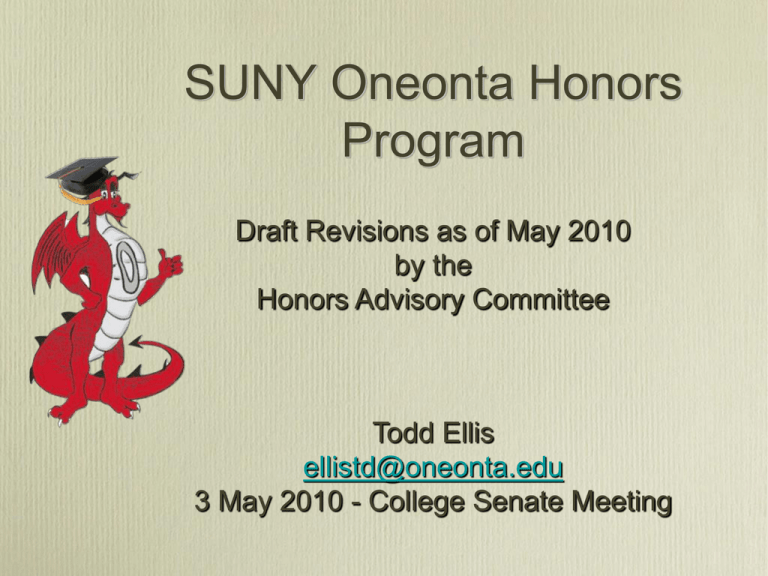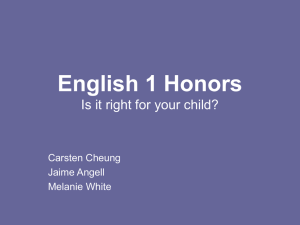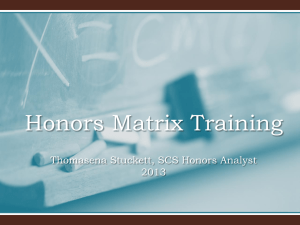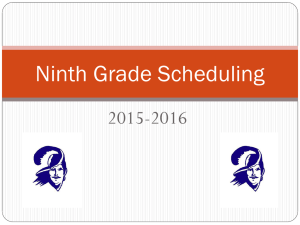SUNY Oneonta Honors Program
advertisement

SUNY Oneonta Honors Program Draft Revisions as of May 2010 by the Honors Advisory Committee Todd Ellis ellistd@oneonta.edu 3 May 2010 - College Senate Meeting The Current Honors Program • Three Tiered: • Stage One - Freshman Year - 9 credit hours of honors GE2 courses • Stage Two - Sophomore Year - 9 credit hours of honors GE2 courses • Stage Three - Junior/Senior Year - 9 credit hours of upper division coursework including a capstone experience The Current Honors Program • Retention Standards • 3.5 GPA at the end of each year + sufficient progress toward degree • Capstone Experience • An interdisciplinary or mutlidisciplinary course designed by students The Main Concerns • Students often have few choices of courses available to them because they have placed out of GE2 courses and because few are offered (and those have low enrollment) • Students get “Honors Program” credit for completing any one tier - many drop out when early scheduling no longer useful • By getting out before tier three - they miss out on the interdisciplinary focus of an honors education The new idea • The Honors Advisory Committee has been meeting since the fall to revamp the program • The main themes: • Embrace interdisciplinary focus of honors education • Enhance communication skills through required honors level composition courses • Allow students to get honors credit by contract with professors • Eliminate tier system, and require all honors students to complete thesis to get credit The Contract Model • Allows students to approach a professor by the end of the third week of a class to propose a plan to make the course count as honors credits • Focus is not necessarily on more work, but on different, more in-depth, interdisciplinary, or original work. • Must be agreed upon by both professor and student - not all courses may be appropriate for this, but faculty have input • Less time consuming for faculty than an entire honors course • Dedicated honors sections/courses will still exist Honors Advisors • We are proposing that departments would have one designated honors advisor • Honors advisors would be able to help explain the contract process and make sure that it is not abused by either party • Honors advisors would require yearly meetings with honors students to make sure they are thinking ahead about their additional requirements Year by Year - First Year • Maintain a 3.5 GPA • Enroll in an Honors Composition Course • • • capped at low number per section • ESL students may get individual waivers Honors first-year interdisciplinary seminar • Thematic courses taught be rotation of instructors • Focus is on critical thinking skills 6 credits of honors course work Year by Year - Second Year • Maintain a 3.5 GPA • By end of year, have 12 honors credits completed • Academic plan with an honors advisor to begin planning for capstone/theses Year by Year - Third/Fourth Year • Maintain a 3.5 GPA • By graduation, have 12 additional honors credits completed • These credits may include honors independent studies to facilitate thesis writing • Upon completion of thesis and all other requirements, students are given honors designation Other thoughts • We are considering making the admission process more selective with online essay prompts that students would have to answer • We want to reinvigorate the honors club, so that they can be an academic presence on campus, perhaps with their own faculty awards or hosted lecture series - there is a funding issue that still needs to be address here We are still welcoming input • We are not making any proposals for voting today, but want to give you a chance to think about how this would work and give us a chance to answer your questions/concerns • We think that this makes the program more robust, more rigorous, and easier for students to become invested in. In short, I think it makes the honors program meaningful for everyone involved • Please contact myself or Julie Freeman if you have any additional concerns









